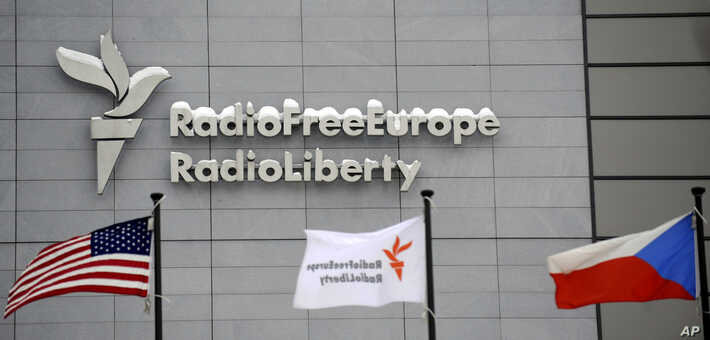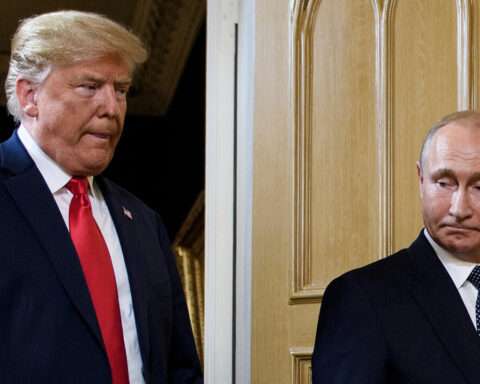Washington, D.C. –Most troublingly, the Putin regime is threatening Radio Free Europe/Radio Liberty with significant fines and possible criminal charges against its employees, posing what has been described as an “existential” threat to the news organization’s operations within Russia. The Members also expressed their concern that as RFE/RL contends with the myriad of challenges across Eurasia, it is also facing an equally perilous internal threat to its vital mission.
“We urge the Biden Administration to engage the Russian government immediately to make clear that these restrictions on RFE/RL, its affiliates and its staff are unacceptable and, in particular, that exposing RFE/RL’s staff to criminal liability will be met with serious consequences,” the lawmakers stated in the letter. “If Moscow proceeds with these actions, then we are prepared to work with your Administration in considering using existing authorities…to sanction Russian officials involved in such decisions and in demanding greater reciprocity between the operating conditions Western outlets, like RFE/RL, face inside Russia and those faced by Russian state-run outlets, such as Russia Today (RT) and Sputnik, here in the United States.”
“More troubling still, as RFE/RL contends with this myriad of challenges across Eurasia, it is also facing an equally perilous internal threat to its vital mission,” the lawmakers went on. “Like other independent broadcasting services supported by USAGM, RFE/RL suffered greatly under Michael Pack’s tenure as USAGM’s CEO through a range of actions he pursued to undermine editorial independence, management safeguards, and career expertise…Immediately restoring the integrity of RFE/RL and other USAGM networks when you take office is urgently important to the United States’ efforts to promote democracy and human rights around the world and to counter the existential threat posed by the Putin regime to RFE/RL’s operations in Russia.”
Dear Mr. President:
As you take office as our 46th President, we are acutely aware of the slate of critical global challenges facing the United States and our allies that will require immediate and sustained attention from the White House and executive branch agencies. As you chart out initial priorities for your Administration, we respectfully suggest that they should include the growing external and internal threats to U.S. international broadcasting at Radio Free Europe/Radio Liberty (RFE/RL).
United States international broadcasting plays an important role in Europe and Eurasia, where RFE/RL seeks to bring unbiased, objective reporting to challenging media environments in both adversarial and allied nations alike. In Russia, brave journalists must compete with the autocratic Putin regime, which is tightening its stranglehold on the flow of information, including by branding independent media organizations and their journalists as “foreign agents” and mandating draconian labeling requirements. RFE/RL, its corporate entity, its regional news sites, and its journalists have all been targeted by the repressive foreign agent law but have refused to label their content as “foreign-agent-produced” for fear it will discredit their work.
Earlier this month, in a dramatic escalation, Russia’s Internet regulator Roskomnadzor announced it was levying hundreds of thousands of dollars in fines on RFE/RL for failing to label their content. Given the magnitude of the threat these new penalties pose to RFE/RL’s operations within Russia, we urge the Biden Administration to engage the Russian government immediately to make clear that these restrictions on RFE/RL, its affiliates and its staff are unacceptable and, in particular, that exposing RFE/RL’s staff to criminal liability will be met with serious consequences. If Moscow proceeds with these actions, then we are prepared to work with your Administration in considering using existing authorities, including those in the Sergei Magnitsky Act, the Global Magnitsky Human Rights Accountability Act and the Countering America’s Adversaries Through Sanctions Act, to sanction Russian officials involved in such decisions and in demanding greater reciprocity between the operating conditions Western outlets, like RFE/RL, face inside Russia and those faced by Russian state-run outlets, such as Russia Today (RT) and Sputnik, here in the United States.
In Belarus, the people have risen up against Alyaksandr Lukashenka. In a desperate attempt to hold on to power and silence his critics, the illegitimate dictator has responded with a violent crackdown, including on independent media. Lukashenka’s regime has harassed, jailed, and stripped the accreditation of journalists, including those working for RFE/RL, disrupted internet access, and blocked social networking sites used by the opposition. He has also accepted help from the Putin regime, who “surged” support for Belarusian state television by sending Russian propagandists to help disseminate pro-Lukashenka propaganda. To date, despite bipartisan urging, the United States Agency for Global Media (USAGM) has failed to similarly boost support for its operations in the country. This is disappointing as the Belarusian opposition has asserted that the strongest weapon they have in their fight to determine their own future is access to accurate information. Therefore, as called for in the bipartisan Belarus Democracy, Human Rights, and Sovereignty Act of 2020, which became law earlier this year, we urge your Administration to provide surge funding for USAGM’s and RFE/RL’s work in Belarus.
Equally important are RFE/RL’s efforts to foster the growth of free press and independent reporting and to fend off the onslaught of Russian and Chinese disinformation and propaganda in allied and partner countries in Europe. In 2019, RFE/RL returned to Bulgaria and Romania. Just last year, RFE/RL reopened its Hungarian service amid a steep decline in the country’s freedom of the press. These services are a crucial tool to strengthen our allies’ democracies and prevent the democratic backsliding that opens the door for Russia, China, and other autocratic competitors to advance their own nefarious interests. We ask that your Administration work with the European Union to continue to strengthen the information space in its member states.
More troubling still, as RFE/RL contends with this myriad of challenges across Eurasia, it is also facing an equally perilous internal threat to its vital mission. Like other independent broadcasting services supported by USAGM, RFE/RL suffered greatly under Michael Pack’s tenure as USAGM’s CEO through a range of actions he pursued to undermine editorial independence, management safeguards, and career expertise. For example, in June, Mr. Pack fired a slate of senior officials, including RFE/RL President Jamie Fly, without cause or explanation, and later took action to entrench his own loyalists on the boards of RFE/RL and the other broadcasters. Mr. Pack’s actions were scrutinized by the House Committee on Foreign Affairs and other Congressional committees of jurisdiction and received widespread, bipartisan condemnation. By undermining the network’s independence, Mr. Pack endangered the credibility of RFE/RL’s reporting with local audiences.
If the United States is to support the people across Eurasia and their demand for greater freedom and transparency, it is critical that your Administration exercise the leeway provided in the FY21 omnibus (Division O, Title XIII, Sec. 1301) to take swift, concrete steps to reverse course. We are pleased that you have already dismissed Mr. Pack and named Kelu Chao as acting CEO until a permanent replacement can be confirmed, but encourage you also to replace the fully partisan board Mr. Pack installed at RFE/RL with appointees that have bipartisan support and the appropriate credentials and to move quickly in appointing a President of RFE/RL who can tackle the challenges outlined in this letter. Immediately restoring the integrity of RFE/RL and other USAGM networks when you take office is urgently important to the United States’ efforts to promote democracy and human rights around the world and to counter the existential threat posed by the Putin regime to RFE/RL’s operations in Russia.






